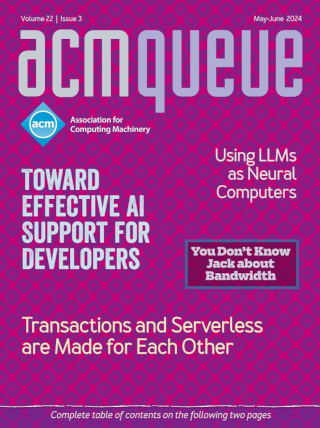Editorial Board
ACM Queue Editorial Board
Peter Alvaro
- Associate Professor of Computer Science at the University of California Santa Cruz
Peter Alvaro leads the Disorderly Labs research group (disorderlylabs.github.io). His research focuses on using data-centric languages and analysis techniques to build and reason about data-intensive distributed systems, in order to make them scalable, predictable and robust to the failures and nondeterminism endemic to large-scale distribution. Peter earned his PhD at UC Berkeley, where he studied with Joseph M. Hellerstein. He is a recipient of the NSF CAREER Award, the Facebook Research Award, the USENIX ATC 2020 Best Presentation Award, the SIGMOD 2021 Distinguished PC Award, and the UCSC Excellence in Teaching Award.
Betsy Beyer
- Technical Writer, SRE, Google
Betsy Beyer is a Technical Writer for Google Site Reliability Engineering in NYC, and the editor of Site Reliability Engineering: How Google Runs Production Systems. She has previously written documentation for Google datacenters and hardware operations teams. Before moving to New York, Betsy was a lecturer on technical writing at Stanford University. She holds degrees from Stanford and Tulane.
Steve Bourne
- Chief Technical Officer, Rally Ventures
Steve Bourne is internationally known for his work on the UNIX operating system. Over the last 20 years he has held senior engineering management positions at leading computer systems and networking companies including Cisco Systems, Sun Microsystems, Digital Equipment and Silicon Graphics. At present he is Chief Technology Officer at Icon Ventures in Menlo Park, California.
At Cisco Steve was responsible for Enterprise Network Management products including CiscoWorks. He established Cisco's leadership in web based network management with the introduction of the Cisco Resource Manager.
At Sun, Steve managed the Solaris 2.0 program including the internal transition from SUNOS to Solaris. Before leaving Sun he led the Solaris network services team (NFS, NIS, DNS and NIS+) and introduced NFS revision 3 to the market. While at Digital, Steve founded and directed the West Coast Workstation Engineering group in Palo Alto that built the first multi-processor VAXstation as well as the first DEC RISC workstations.
Steve spent nine years at AT&T Bell Laboratories where he was a member of the Seventh Edition UNIX team. He designed the UNIX Command Language or "Bourne Shell" which is used for scripting in the UNIX programming environment. He also wrote the ADB debugger. In 1983, Steve published his book called The UNIX System which has been widely recognized as a text for the effective use of UNIX.
He holds a B.Sc. in Mathematics from King's College London, a Diploma (or M.Sc.) in Computer Science from Cambridge University and a Ph.D. in Mathematics from Trinity College in Cambridge, England.
Steve is a Fellow and Past President of the ACM, a Fellow of the Royal Astronomical Society, and a Fellow of the Cambridge Philosophical Society.
Terry Coatta
- CTO Marine Learning Systems
Marine Learning Systems produces software to provide training in the maritime environment. The system uses a unique opportunistic replication protocol to provide full off-line access to on-vessel instances of the platform. Past positions include Vice President of Development at Silicon Chalk, which developed real-time collaborative software for use in higher education, and Director of Development for Distributed Systems at Open Text Corporation. Terry's interests lie in distributed computing and software development processes. He has a Ph.D. in computer science from the University of British Columbia.
Mark Compton
- Hired Gun Communications
Mark Compton, who now runs a publishing and marketing communications consulting group called Hired Gun Communications, has worked in the technology space for over 25 years for the likes of Cisco, Sun, HP, Adobe, 3Com and many of the other household names, along with a host of far less familiar startups almost beyond counting.
Before going out on his own, he headed up marketing programs at Silicon Graphics, where he was the driving force behind the branding program for the company's Indigo family of desktop workstations. Over a four-year period in the mid-1980s, he served as editor-in-chief of Unix Review, at the time considered the leading publication for Unix software engineers.
Nicole Forsgren
- Partner, Microsoft Research
Nicole Forsgren is a Partner at Microsoft Research leading developer productivity research and strategy. She is best known for the Shingo Publication Award-winning book Accelerate and the State of DevOps Reports. Her work focuses on measuring the technology process and improving productivity and software delivery. Nicole's work spans industry and academia, with positions including professor, sysadmin, software/performance engineer, and startup founder with an exit to Google. She has been awarded public and private research grants (funders include NASA and the NSF), and her work has been published in several peer-reviewed journals. Nicole earned her PhD in Management Information Systems and her Masters in Accounting from the University of Arizona.
Camille Fournier
- JP Morgan Chase
Camille Fournier is a writer, speaker, and entrepreneur. Formerly the CTO of Rent the Runway, she serves on the technical oversight committee for the Cloud Native Computing Foundation, as a Project Management Committee member of the Apache ZooKeeper project, and a project overseer of the Dropwizard web framework. She has an M.S. from the University of Wisconsin-Madison and a B.S. from Carnegie Mellon University. You can find more of her writing at elidedbranches.com.
Ben Fried
- Rally Ventures
From 2008 through 2021, Ben was Google's Chief Information Officer, overseeing the creation and deployment of technologies and systems that power Google's enterprise and make Googlers uniquely productive. Ben has a diverse background in systems engineering and software development. He has led development of mission scheduling software for NASA at a Bay Area startup and spent over a decade at Morgan Stanley, where he rose to the level of Managing Director and led teams responsible for software development, internet infrastructure, and business intelligence.
Ben is a graduate of Columbia University.
Chris Grier
- Software Engineer, Google
Chris Grier, Ph.D. is a software engineer at Google where he works in security and privacy. Before joining Google, he lead engineering teams and has also been an academic at UC Berkeley where he worked on applying measurement to better understand security issues including cybercrime, exploits, and account abuse. He also dabbles in hardware projects with embedded processors and microcontrollers. Chris received his Ph.D. at the University of Illinois at Urbana-Champaign in Electrical and Computer Engineering.
Tom Killalea
- Advisor
Tom Killalea is an advisor to technology-driven companies. He is chair of the board of MongoDB, and serves on the boards of Capital One, Akamai, Satellogic, and Orreco. He is on the technology advisory panel of Enterprise Ireland. He served in various leadership roles at Amazon, including CISO and VP of Infrastructure. He holds a B.Ed. in Education from the National University of Ireland, and a B.S. in Computer Science from Trinity College Dublin.
Tom Limoncelli
- Site Reliability Manager, StackOverflow.com
Tom Limoncelli is an internationally recognized author, speaker, and system administrator. His best known books include Time Management for System Administrators (O'Reilly) and The Practice of System and Network Administration (Addison-Wesley). In 2005 he received the SAGE Outstanding Achievement Award. He works in New York City at StackOverflow.com. Previously he's worked at small and large companies including Google, Bell Labs / Lucent, AT&T. http://EverythingSysadmin.com is his blog.
Kate Matsudaira
- SoFi
Kate Matsudaira has just recently made a foray into novel territory as founder of her own company, Popforms. Prior to that she worked in engineering leadership roles at companies such as Decide (acquired by eBay), Moz, and Amazon. Her technical experience spans a wealth of areas, but she has consistently been involved with the construction of high performance distributed systems and systems addressing data collection and analysis. Kate is also well-known for her blog (katemats.com) on which she deals with issues in leadership and management.
Erik Meijer
- Facebook
Erik Meijer has been working on "Democratizing the Cloud" for the past 15 years. He is perhaps best known for his work on the Haskell language and his contributions to LINQ and the Reactive Framework (Rx).
George Neville-Neil
- Consultant
George V. Neville-Neil, works on networking and operating system code
for fun and profit. He also teaches courses on various subjects
related to programming. His areas of interest are computer security,
operating systems, networking, time protocols, and the care and
feeding of large code bases. He is the author of The Kollected Kode
Vicious and co-author with Marshall Kirk McKusick and Robert
N. M. Watson of The Design and Implementation of the FreeBSD
Operating System. For nearly twenty years he has been the columnist
better known as Kode Vicious. Since 2014 he has been in Industrial
Visitor at the University of Cambridge where he is involved in several
projects relating to computer security. He earned his bachelor's
degree in computer science at Northeastern University in Boston,
Massachusetts, and is a member of ACM, the Usenix Association, and
IEEE. His software not only runs on Earth but has been deployed, as
part of VxWorks in NASA's missions to Mars. He is an avid bicyclist
and traveler who currently lives in New York City.
Theo Schlossnagle
- Founder and Distinguished Engineer, Circonus
Theo Schlossnagle is the founder and a Distinguished Engineer at Circonus where he aims to better the world of monitoring through large-scale numerical data analysis. A widely respected industry thought leader, Theo is the author of Scalable Internet Architectures (Sams) and a frequent speaker at technology conferences worldwide. He founded OmniTI, an Internet consultancy that has helped over 10% of the world's largest websites. From OmniTI, he incubated Sparkpost (acquired by MessageBird) which provides a messaging platform to the world's largest Internet companies. Theo earned his bachelor's and master's degrees in computer science from Johns Hopkins University; additionally he spent an extended time researching distributed systems at JHU's Center for Networking and Distributed Systems. From near Washington DC, he enjoys raising his three daughters and splitting time between his butcher shop and small farm.
Kelly Shortridge
- Senior principal in product technology at Fastly.
Kelly is co-author with Aaron Rinehart of Security Chaos Engineering (O'Reilly Media) and is an expert in resilience-based strategies for systems defense. Their research on applying behavioral economics and DevOps principles to information security has been featured in top industry publications and is used to guide modernization of information security strategy globally.
Phil Vachon
- Security Architecture and Engineering Manager with Bloomberg's Office of the CTO
Phil Vachon and his team work on projects related to identity, authentication, and the application of data science to operational security challenges. Prior to his current role at Bloomberg, Phil co-founded a startup focused on high-speed packet capture and analysis. He's also developed high-frequency trading systems, designed and implemented firmware for identity and security infrastructure devices, built synthetic aperture radar data processing tools, and worked on data plane traffic engineering for carrier routers. His main interests are developing threat models that are relevant to business problems, designing secure embedded systems, and working to improve individual privacy protections in our increasingly connected world.
Jim Waldo
- Chief Technical Officer and Professor, Harvard University
Jim Waldo is a Gordon McKay Professor of the Practice of Computer Science in the John A. Paulson School of Engineering and Applied Sciences at Harvard, where he teaches courses in distributed systems and privacy.
He is also the Chief Technology Officer for SEAS, and a professor of technology policy in the Harvard Kennedy School, where he is associated with the Belfer Center, the Shorenstein Center, and the Carr Center.
Prior to being the CTO at SEAS, Jim was the first Chief Technology Officer for Harvard University.
Jim has designed clouds at VMware, and was a Distinguished Engineer with Sun Microsystems Laboratories, where he investigated next-generation large-scale distributed systems.
While at Sun, he was the technical lead of Project Darkstar, a multi-threaded, distributed infrastructure for massive multi-player on-line games and virtual worlds; the lead architect for Jini, a distributed programming system based on Java; and an early member of the Java software organization.
Before joining Sun, Jim spent eight years at Apollo Computer and Hewlett Packard working in the areas of distributed object systems, user interfaces, class libraries, text and internationalization.
While at HP, he led the design and development of the first Object Request Broker, and was instrumental in getting that technology incorporated into the first OMG CORBA specification.
Jim is the author of "Java: the Good Parts" (O'Reilly) and co-authored "The Jini Specifications" (Addison-Wesley).
He edited "The Evolution of C++: Language Design in the Marketplace of Ideas" (MIT Press).
He co-chaired a National Academies study on privacy, and co-edited the report "Engaging Privacy and Information Technology in a Digital Age."
He holds over 50 patents.
Jim received his Ph.D. in philosophy from the University of Massachusetts (Amherst).
He also holds M.A. degrees in both linguistics and philosophy from the University of Utah.
He is a member of the IEEE and ACM.





